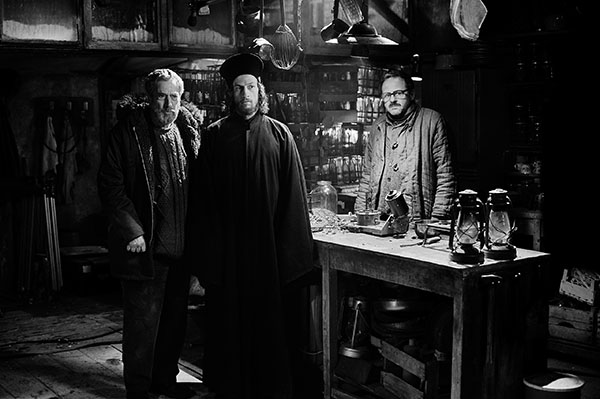January is a bit too vague with its themes to be a modern classic, but its striking imagery makes up for the lulls in pacing.
Turning a stage play into a movie is always a challenging task because, at its core, a play (unlike a musical) is inherently uncinematic. People in a single location talking for two hours can be entertaining, there is no doubt about that. However, when you have restrained your narrative as such, it is difficult to implement creative choices that make the film interesting to watch while also not being obvious that you are trying to cover up weaknesses in other areas. At their best, you get classic films such as A Streetcar Named Desire and Who’s Afraid of Virginia Woolf?, which know when to add in a flashy camera move or two and when to let the actors do their thing. January, the first narrative film from documentarian Andrey Paounov, is adapted from a play by Nobel Nominee Yordan Radichkov, but you would not know that while watching. The movie, directed by Paounov and co-written with Alex Barrett, does its best to make a simple story cinematic and largely succeeds, even if the message may get muddled along the way.
Describing the story of January in a sentence, or even a paragraph, would be an exercise in futility. At its simplest, the story can be described as that of two men in the middle of nowhere who are visited over the course of the day by various individuals looking for one Petar Motorov. However, this is not what the movie is actually about. Like all good arthouse cinema, January is much more concerned with the subtext and philosophy of the piece than it is with the plot. Barrett and Paunov illustrate this to the viewer by writing the story in the same way you would a myth or fable. None of the characters have names: it is only The Porter (Samuel Finzi), The Old Man (Iossif Surchadzhiev), The Twins (Zachary Baharov and Svetoslav Stoyanov), and The Priest (Leonid Yovchev). Additionally, the only places that seem to exist are the woods, the city, and the outpost the story takes place in, a wooden shack built next to a decrepit soviet-era school.
It does not take long in the story to realize that all these elements are symbolic. Early in the film, we are clued into the film’s preoccupation with the fall of communism in Eastern Europe when the porter scavenges through the abandoned school, which is filled with communist paraphernalia, all now in various stages of disarray. This is further developed when one of the characters has an extended monologue deriding the modernity of the city and its lax morals, obviously a comparison to the free-market capitalism that flourished after the fall of the USSR.

While these themes (along with others such as death, morality, and nature) are compelling, they all feel underexplored by the time the movie ends. As the characters enter and exit the narrative, it becomes clear that Petar Motorov is supposed to stand for something but after the third conversation about his whereabouts (he went into the forest the night before the story starts) it is unclear whether Motorov is supposed to represent God, the Devil, Death, or something else entirely. If you want clear answers about anything, then this may not be the movie for you.
Where the film does succeed is in crafting an atmosphere of weary dread. Cinematographer Vasco Viana captures the decay of the landscape with a hazy black and white that gives the image the feeling of a memory that is quickly slipping away from you. Even when the film switches to color for one memorable scene, that haze persists, keeping the tone alive even as the narrative pivots from the allegorical to the supernatural in a tasteful reference to Kubrick’s The Shining. The score by Ivo Paunov recalls the music of the films by Andrei Tarkovsky, especially in the scenes set in the (possibly) haunted woods, relying heavily on eerie wind compositions sure to fill you with unease. Even if the story fails you, January is an undeniably impressive visual achievement, taking both the best of classic art films and modern masterpieces to create a hypnotic film that you will not soon forget.
January will be released in cinemas and on digital in the UK on 27 January, 2023.

